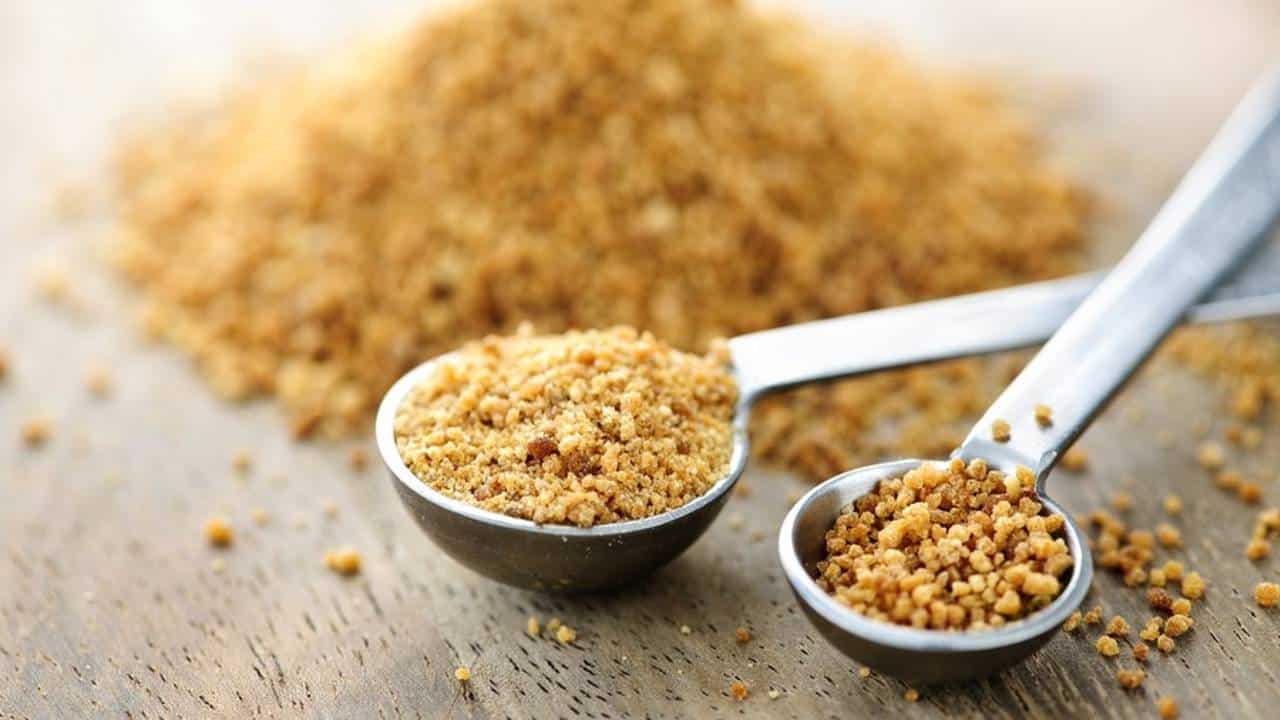
A dietitian’s Verdict: Which is the healthiest and tastiest natural sweetener?
We all know that sugar is not “good” for us. Too much may contribute to diabetes and heart disease. The new World Health Organization guidelines suggest limiting added sugar to a max of 10% of our calories per day. This works out to about 6 tsp or 25g of added sugar per day for the average adult.
This has many of us looking for sugar alternatives or sugar substitutes. While traditional non-nutritive sweeteners like aspartame and sucralose are safe options, many consumers tend to prefer options marketed as more “natural.” Today I’m going to chat about four of those sugar alternatives: Agave nectar, Coconut Plan Sugar. Xylitol and date syrup.
Coconut Palm Sugar
Coconut products have been hugely popular lately, from coconut water to oil to milk. Coconut palm sugar is a natural sweetener alternative. It is made from the nectar from the tree flowers. The Food and Agriculture Organization of the United Nations believes palm sweeteners are the most sustainable sweetener on the planet.
Coconut palm sugar can be substituted 1:1 for sugar in recipes, as it is of similar sweetness to sugar. It is dark in colour and has a rich flavour, so may be a better substitute for brown sugar.
Coconut Palm sugar was given popularity recently due to a feature on the Dr OZ show, Oz claims Coconut Palm sugar can stabilize your blood sugar and contains iron and vitamins. The blood sugar claims are an exaggeration. We don’t eat sugar on it’s own, but mixed with other foods that affect blood sugars in different ways. Glycemic load is more applicable and important to our daily lives than the individual glycemic index of a single ingredient.
Dr Oz also claims coconut palm sugar is high in potassium, iron and vitamins. The Nutrition facts table states a serving contains 2% of the daily value for Vitamin C and 1% for iron.
So while coconut palm sugar may be slightly more nutritious than regular sugar. But unless you eat mass quantities it doesn’t contain enough of these vitamins or minerals to consider it decent source of anything. Other than calories, at 18 cals per tsp (regular sugar is 16 cals per tsp).
Xylitol
Xylitol is a sugar alcohol sweetener that is extracted from hardwood trees, and fibers of some fruits and vegetables. It can also equally be substituted for sugar, as the sweetness level is similar. However, it contains less calories (10 calories per tsp, where as sugar has 16 calories per tsp).
Xylitol has no aftertaste, and has a low glycemic index of 13, so it does not have a large effect on increasing blood sugars.
Another benefit of xylitol is that is tooth-friendly and may help prevent cavities, as opposed to cause them! You can find xylitol sweetened toothpastes and mouthwashes, which are a great alternative to fluoride, especially for young children. There are also interesting claims that xylitol may be helpful with infections, yeast and building bone.
Xylitol is not new, and was developed in Europe over 100 years ago. Studies show it is safe, with the only negative side effect being gas and diarrhea at very large doses. However used in moderation, this is not a problem, unless you have Irritable Bowel Syndrome.
One concern I have with sugar alternatives is their potential to alter gut bacteria. We are learning more and more about how gut bacteria is so important to our health! Xylitol has the potential to decrease fecal bacteroidetes. This is not a positive, as the more good bacteria in our gut, the better. However it can also protect against some more dangerous bacteria like C difficile.
Note: Xylitol is toxic for dogs, so make sure it keep it out of Fido’s reach!
Date Sugar
Date sugar is made from dried dates, and can be a good alternative to brown sugar. It has the nutritional benefits of dried fruit, rather than just calorie-dense sugar. Date sugar doesn’t dissolve or melt well, so it’s use is somewhat limited.
When comparing sweeteners, the only two sweeteners with much nutritional value are date sugar (ground-up dates) and molasses (which is high in minerals like iron).
Looking up the nutrition information for Bob’s Red Mill date sugar, the nutrition facts table still states it contains 0% Daily Value for the listed vitamins and minerals and 11 calories. Why? Because a serving size is 1 tsp. If you ate ½ cup, it would likely contain more nutrients! In the small amounts that we should use sweeteners, the trace nutrients do not really add up to play a big part in our total diet.
I couldn’t find date sugar in my grocery store, so I looked up a recipe for date syrup. I have found the date sugar before, as part of a food co-op, and natural foods stores may also carry it. I would use it as a brown sugar alternative at home, if it was more easily accessible.
Agave Nectar
Agave nectar is one of those foods that has a ‘health halo around it. A health halo is the perception that a food is good for you. Even when there is little evidence to confirm this.
Yes, ‘agave’ sounds sophisticated. And it’s expensive. And perhaps you have heard it has a lower glycemic index than sugar. That’s true.
And even though agave nectar has the same number of calories as sugar, it is 1.5 x sweeter than sugar. So you shouldn’t need to use as much. Which is good too.
So, why don’t I love agave then?!
While there’s a perception that it contains antioxidants, vitamins and minerals. No. Certainly not enough to count, at the quantities you would normally consume.
But the main reason is that agave nectar contains more fructose than even high fructose corn syrup (HFCS). Sources vary, but agave can be up to 90% fructose, whereas HFCS is 55%.
So, what’s wrong with fructose? Maybe nothing. And I certainly wouldn’t worry about the natural fructose found in fruit. It comes along with a host of other nutrients and fibre, to slow down sugar absorption.
But fructose has been associated with unhealthy changes of blood cholesterols and decreased insulin sensitivity in humans. And far more in rats (like obesity, diabetes and high blood pressure) – but it’s still just theory in humans.
Even regular sugar is 50% fructose. So the overall concern may be high sugar intake overall.
And if you eat a little bit of agave here and there, I wouldn’t worry about it. But if you substitute all sugar for agave, I would re-think your choice. At least for your pocketbook ?
Taste Test Comparison of sugars
I tried baking banana muffins with date syrup, coconut palm sugar, xylitol and regular granulated sugar. They all tasted great. The coconut palm sugar is dark, so better to replace brown sugar in recipes. The xylitol muffins were a bit crumbly. The date muffins “spread out” over the pan (as I didn’t decrease the amount of liquid in the recipe), but were a flavor favourite! To serve to company, I would probably stick with the regular sugar, as they looked most appealing!
I also tried the coconut palm sugar and xylitol to sweeten lattes. They both were fine – added a bit of sweetness, mixed in well and left no aftertaste. I regularly use xylitol in my lattes if I’m using and unsweetened almond milk, to add a bit of sweetness. And I’ve noticed the sensitivity of my teeth to hot and cold has decreased!
I also tested the coconut palm sugar, xylitol and date syrup in oatmeal. They all tasted good. I actually preferred the date syrup, as it gave the oatmeal a nice hint of date flavour.
The Verdict: Which is the healthiest and tastiest sugar alternative?
I probably won’t repurchase the Coconut Palm sugar. It’s more useful for replacing brown sugar, which I don’t use a lot of. And would prefer Date Sugar for this purpose.
However, I buy xylitol and use it as a sweetener in my coffee. I am most intrigued by the benefits to teeth, as my children have had issues with cavities.
The date syrup was great in my oatmeal. It’s a pain to make, so I don’t often use it though. But if you can find some date syrup or sugar in a store, I would recommend grabbing it and using it as a brown sugar alternative.
Founder of First Step Nutrition | Registered Dietitian Nutritionist
Jen believes raising happy, well-nourished eaters who have a healthy relationship with food doesn't have to be a battle! She is an author and speaker with 18 years of experience specializing in family nutrition and helps parents teach their kids to try new foods without yelling, tricking, or bribing.






Sorry, the comment form is closed at this time.